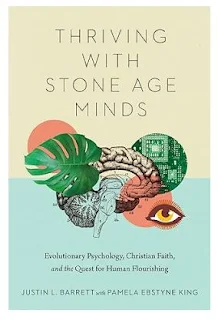Thriving with Stone
Age Minds: Evolutionary Psychology, Christian Faith, and the Quest for Human
Flourishing (BioLogos Books on Science and Christianity)
By Justin L. Barrett
and
Pamela Ebstyne King
On AMAZON
Reviewed by
Geoffrey W. Sutton
I’m in the process of writing about
irreconcilable differences between Christianity and psychology. Thriving
with Stone Age Minds surprised me. Not only does Barrett affirm evolution
but he explains evolutionary psychology and how it may relate to Christian
theology.
***
Thriving with
Stone Age Minds: Evolutionary Psychology, Christian Faith, and the Quest for
Human Flourishing by Justin
L. Barrett delves into the intersection of evolutionary psychology,
Christian theology, and human flourishing. In this thought-provoking work,
Barrett and co-author Pamela Ebstyne King explore how our evolutionary
past shapes our present minds, relationships, and behaviors.
The book begins by
acknowledging the controversy surrounding evolutionary psychology, especially
within Christian circles. However, Barrett and King argue that this field can
be a valuable tool for understanding human nature and purpose. They provide an accessible
introduction to evolutionary psychology, highlighting three key concepts such
as hyper-sociality, information gathering, and self-control.
One central insight
from evolutionary psychology is how humans adapt to and alter their
environments, or niches. We change our world faster than our minds can
keep up, leading to gaps in our fitness. Essentially, we find ourselves
attempting to thrive in modern contexts with Stone Age minds. By integrating
scientific evidence with theological anthropology, the authors propose ways to
close these nature-niche gaps and enhance human flourishing.
The book also
emphasizes the importance of understanding our evolutionary heritage. When we
recognize that we still bear the marks of our Stone Age past, we gain fresh
perspectives on puzzling aspects of our minds and relationships. Barrett and
King draw connections between evolutionary psychology and biblical faith,
shedding light on questions like: What is human flourishing? How can we align
our distinctively human purpose with our evolutionary history?
***
Overall, the book is a
bit of a puzzle. On the one hand, explaining the relationship between evolution
and evolutionary psychology requires some effort for readers who may have
limited knowledge of both disciplines. Although more and more Christians are accepting
evolution as a fact, many remain staunch creationists (Sutton, 2024, 2025). Adding psychology to the
mix will likely pose a challenge for Christian college students. On the other
hand, the authors want to offer us a path to flourishing, which is a topic
within positive psychology; however, along the way, Barrett and King make
connections with an evangelical approach to Christianity. It’s this attempt to
merge two sciences with a conservative theological view of Christianity that
needs more work. I wish them well.
References
Barrett, J. L., & King, P. E. (2021). Thriving with stone age minds:
Evolutionary psychology, Christian faith, and the quest for human flourishing. InterVarsity Press.
Sutton, G. W. (2025). Eve, a serpent, and a woman’s place: Relating Christianity and psychology. Sunflower.
Sutton, G. W. (2024). Irreconcilable differences? Apes, Adam and an ark: Relating Christianity and psychology. Sunflower. ISBN = 979-8323386581
Cite this review
Sutton, G. W. (2024, March 6). Can Christians evolve? A review of Thriving with Stone Age Minds. Interdisciplinary Book and Film Reviews. Retrieved from https://suttonreviews.suttong.com/2024/03/can-christians-evolve-review-of.html
 |
| Available on AMAZON |
Geoffrey W. Sutton, PhD is Emeritus Professor of Psychology. He retired from a clinical practice and was credentialed in clinical neuropsychology and psychopharmacology. His website is www.suttong.com
See Geoffrey Sutton’s books on AMAZON or GOOGLE STORE
Follow on FACEBOOK Geoff W. Sutton
TWITTER @Geoff.W.Sutton
You can read many published articles at no charge:
Academia Geoff W Sutton ResearchGate Geoffrey W Sutton

Comments
Post a Comment